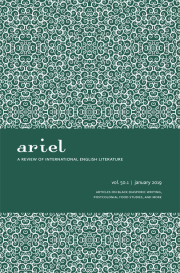The Politics of Food and Appetite in Anita Desai’s Fasting, Feasting and V. S. Naipaul’s Half a Life
Keywords:
food, appetite, Mohandas Ghandhi, vegetarianism, Anita Desai, V. S. NaipaulAbstract
The novels Fasting, Feasting (1999) by Anita Desai and Half a Life (2001) by V. S. Naipaul share themes, character constellations and structural characteristics. Both novels deal with sons who resist their father’s dietary practices. Both sons are raised in post-liberation India and later emigrate to the West. Both sons’ lives highlight the political meanings of food and appetite in India. Both novels are driven by the same basic conflict: the tension between food and appetite on the one hand, and dietary restrictions and self-restraint on the other. In this article, I argue that understanding the politics of food and appetite in these novels requires a postcolonial approach, an approach that exposes the ways in which a history of domination has charged material practices with political meanings. I will show that Desai’s and Naipaul’s novels implicitly relate the fates of their protagonists to Indian nationalism’s ambivalence about whether to embrace the meat eating of the former British colonizers or to promote vegetarianism and fasting as elements of national identity. Both novels’ point of reference is Mohandas Gandhi, who first made meat eating and then vegetarianism and fasting central elements of his liberatory nationalism. Both protagonists struggle with the legacy of their fathers who had either rejected or embraced Gandhi’s call for a meatless diet. The sons’ resistance to the fathers’ customs implies different critiques of the politics of food and appetite in post-liberation India.


